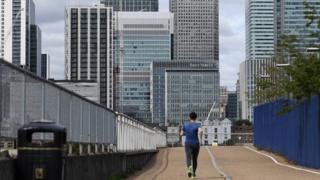 Image copyright
EPA
Image copyright
EPA
People will again be encouraged to go back to their workplaces as part of a government campaign starting next week.
Employers who have had staff working from home for months will be asked to reassure them that it is safe to return by highlighting measures being taken to prevent the spread of Covid-19.
Business leaders have warned of damage being done to city centres as people stay away from offices.
The campaign will launch as most schools in England and Wales reopen.
It will predominantly be promoted through regional media, the BBC's political correspondent Iain Watson said.
Whitehall sources insist the campaign will not suggest those who continue to work from home are at any greater risk of losing their jobs, he added.
The messaging comes as head teachers say they are ready to welcome young people back to school in England and Wales full-time next week.
That should make a return to the workplace more feasible for many parents.
'Ghost towns'
The head of employers' organisation the CBI warned this week that city centres could become "ghost towns" if the prime minister did not do more to encourage workers back to the office.
Dame Carolyn Fairbairn said that with offices empty, thousands of local businesses that relied on the passing trade were suffering.
Some prominent Conservative MPs share her concerns and have urged ministers to deliver a clear and consistent message that it is safe to go back.
But Health Secretary Matt Hancock said getting staff back to work was a "matter for employers" and, when asked about the Department for Health and Social Care, that his interest was in how employees performed.
"Some of them have been working from home, some come in sometimes, some are in full-time - and what matters to me is that they deliver and, frankly, they've been delivering at an unbelievable rate," he told the Times Radio.
Transport Secretary Grant Shapps told BBC Breakfast his own department was now encouraging people to return to the office but it was "a gradual process".
He acknowledged the return of pupils to school and parents to work tended to "create pressures" on the public transport system.
"We'll be watching those very carefully and looking to, for example, in some cases to run additional services where we see those problems bubble up," he said.
Reluctance
A BBC study found 50 major UK employers had no plans to return all staff to the office full-time in the near future.
One of the main reasons given was that firms could not see a way of accommodating large numbers of staff while social distancing regulations were still in place.
The prime minister first instructed people to work from home in March.
The restrictions began to ease slightly in England in May, when Boris Johnson said people who could not work from home - such as those in construction and manufacturing - should return to the workplace.
In July, Mr Johnson told people to "start to go back to work now if you can" and has repeated the plea since then.
On Thursday, the UK recorded its highest number of new daily Covid-19 infections since mid-June - but there was also a new low in the number of people being treated in hospital.

 5 years ago
563
5 years ago
563 

